|
|
|
Sort Order |
|
|
|
Items / Page
|
|
|
|
|
|
|
| Srl | Item |
| 1 |
ID:
100186
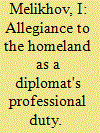

|
|
|
|
|
| Publication |
2010.
|
| Summary/Abstract |
Homeland and adherence to professional duty. They had to perform such urgent, top priority tasks as mobilizing the international capabilities of the Soviet Union to rebuff the Fascist aggression, prevent enlargement of the Fascist coalition, and take advantage of the contradictions in the enemy camp to effect its split. In order to perform these momentous tasks, Soviet diplomats were required to have the following capabilities: in-depth knowledge of all the intricacies of international problems as a whole and of those in their immediate work field in particular; high resistance to stress; the ability to work efficiently under psychological pressure and in conditions of high physical exertion; the competence to rapidly make decisions and carry them out in perpetual extraordinary situations; and the ability to subtly bring partners round to their way of thinking during talks and negotiations.
|
|
|
|
|
|
|
|
|
|
|
|
|
|
|
|
| 2 |
ID:
126175


|
|
|
|
|
| Publication |
2012.
|
| Summary/Abstract |
September 11 and the subsequent anthrax attacks marked the beginning of significant investment by the federal government to develop a national public health emergency response capability. Recognizing the importance of the public health sector's contribution to the burgeoning homeland security enterprise, this investment was intended to convey a "dual benefit" by strengthening the overall public health infrastructure while building preparedness capabilities. In many instances, federal funds were used successfully for preparedness activities. For example, electronic health information networks, a Strategic National Stockpile, and increased interagency cooperation have all contributed to creating a more robust and prepared enterprise. Additionally, the knowledge of rarely seen or forgotten pathogens has been regenerated through newly established public health learning consortia, which, too, have strengthened relationships between the practice and academic communities. Balancing traditional public health roles with new preparedness responsibilities heightened public health's visibility, but it also presented significant complexities, including expanded lines of reporting and unremitting inflows of new guidance documents. Currently, a rapidly diminishing public health infrastructure at the state and local levels as a result of federal budget cuts and a poor economy serve as significant barriers to sustaining these nascent federal public health preparedness efforts. Sustaining these improvements will require enhanced coordination, collaboration, and planning across the homeland security enterprise; an infusion of innovation and leadership; and sustained transformative investment for governmental public health.
|
|
|
|
|
|
|
|
|
|
|
|
|
|
|
|
| 3 |
ID:
158156


|
|
|
|
|
| Summary/Abstract |
Recently, scholars have identified the existence of a distinct Israeli diaspora, as a group separate from the wider Jewish diaspora. The article presents quantitative data collected in Australia that supports this perception. The distinctiveness of Ausraelis ‒ the Israeli diaspora in Australia ‒ is manifested in detachment from Australian Jewry; the preservation of Israeli national identity; and an affiliative model of ties with the ‘real’ homeland, Israel, as opposed to an affiliative interaction of the Jewish diaspora with Israel, the ‘virtual’ homeland.
|
|
|
|
|
|
|
|
|
|
|
|
|
|
|
|
| 4 |
ID:
110789


|
|
|
|
|
| Publication |
2012.
|
| Summary/Abstract |
A new political development that emerged after the disintegration of the Soviet Union was the adoption of 'homeland stances' by the newly independent states. Through the construction of the homeland image, the states of the region claimed responsibility not only for their own citizens, but also for a diaspora community of co-ethnics. Kazakhstan became one of these states and its leadership portrayed Kazakhstan as the homeland of the Kazakh diaspora. Furthermore, Kazakhstan's leadership developed far more active homeland rhetoric and initiated an ethnic return-migration policy as early as 1992. This paper will explore the discourse of Kazakhstan's leadership on the repatriation of its co-ethnics as well as the legal and political context that it created to achieve their smooth absorption into domestic society.
|
|
|
|
|
|
|
|
|
|
|
|
|
|
|
|
| 5 |
ID:
181339
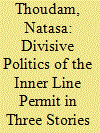

|
|
|
|
|
| Summary/Abstract |
In the context of the Citizenship (Amendment) Act, 2019, and the National Register of Citizens in Assam, this paper interrogates the xenophobic dimensions of Meitei nationalism that translated into a demand for the implementation of the Inner Line Permit (ILP) regime in Manipur in India’s Northeast. The ILP was extended to Manipur in 2019, regulating the entry of ‘outsiders’. Moreover, the recent pandemic has also visibilised the figure of a migrant worker. This paper, however, goes back several years earlier to examine literary representations of the anti-migrant ILP demand. It also highlights its gendered aspect by looking at three texts by ‘dominant’ Meitei women: Ngaseppam Nalini (Nee) Devi’s ‘Mukti’ (2002), Huirongbam Benubala’s ‘Blockade’ (2000) and Kshetrimayum Subadani’s ‘The Heat and the Agony’ (2007). Drawing on theorisations by Anne McClintock and Rosemary Marangoly George, and focussing on the figure of the migrant worker, these stories open up the question of belonging beyond the scope of the nation.
|
|
|
|
|
|
|
|
|
|
|
|
|
|
|
|
| 6 |
ID:
188178
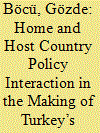

|
|
|
|
|
| Summary/Abstract |
Recent accounts in diaspora studies have advanced our understanding of various political, social and economic transnational phenomena and processes that take place between the home state and the diaspora. However, there is a growing trend in the literature that focuses on home-state diaspora relations at the expense of the core tenant of the transnationalism framework, namely the assumption that immigrant transborder politics and connections span various dynamics that involve both the home and the host country. In this article, I argue that we must revisit calls for simultaneity and turn to the interaction of policies between the home and host state when analyzing diaspora making and shaping processes. To demonstrate my argument, I analyze historical policy interactions between Turkey’s diaspora policy and Germany’s immigration and integration policy and show how interactive dynamics between the home and host country have simultaneously shaped politics in Turkey’s diasporas over time.
|
|
|
|
|
|
|
|
|
|
|
|
|
|
|
|
| 7 |
ID:
101854
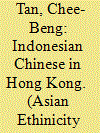

|
|
|
|
|
| Publication |
2011.
|
| Summary/Abstract |
This paper describes the re-migration and adjustment of Indonesian Chinese to living in Hong Kong and their cultural belonging to Hong Kong, China, and Indonesia. Known in China as guiqiao or 'Returned Overseas Chinese', these were Chinese who re-migrated from Indonesia to mainland China in the 1950s and 1960s. By the early 1970s, many were allowed to migrate to Hong Kong. Although arriving with very little money, many have succeeded in establishing a fairly good life in Hong Kong, although there are also many who survive on low incomes. This paper discusses the experiences of the Indonesian Chinese in relation to local and transnational belonging, the perception of homelands, and the re-establishment of a Southeast Asian lifestyle in Hong Kong.
|
|
|
|
|
|
|
|
|
|
|
|
|
|
|
|
| 8 |
ID:
130744
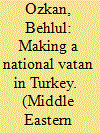

|
|
|
|
|
| Publication |
2014.
|
| Summary/Abstract |
The concept of homeland, vatan, the essential part of the nation-state establishing the link between the people and the territory, territorializes the national identity by creating a sense of belonging to the sacred soil and turning the imagined boundaries into physical ones. In Turkey, constructing the borders of the national identity and vatan required the transformation of the Ottoman imperial paradigm into a nation-state. Republican reforms were unprecedented in terms of combining Turkish identity with territoriality. With the establishment of the Turkish nation-state, a sense of nationalism substituted servitude to the sultan with loyalty to vatan. This was revolutionary in that the nation was disassociated from Islam and God as the community of believers and from the Ottoman sultan as his loyal servants and now was anchored to the life-giving vatan. This article examines the change in the pedagogy of space in Turkey from the late nineteenth century to the first three decades of the twentieth century, exploring how the mental maps of Turkish people shifted from an imperial to a national scope.
|
|
|
|
|
|
|
|
|
|
|
|
|
|
|
|
| 9 |
ID:
189397
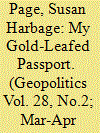

|
|
|
|
|
| Summary/Abstract |
This paper explores through visual arts the making of borders and nations and how they affect bodies and their mobility through the work of visual artist Susan Harbage Page. Harbage Page has created work about the U.S-Mexico Border since 2007 which explores why certain bodies are contested due to race, or status (refugee vs. illegal), and personal histories (culture/birthplace/social/marriage). This article examines how prescribed roles determine different levels of access to safety, work, and privilege. How social and political contexts of race, class, gender, and sex determine how an individual body experiences bordering practices. How a passport becomes one of the symbols agreed upon as a marker of belonging in a particular nation and only functions if it is respected and understood by other nations outside its boundary lines. It also explores the positionality and personal history of the researcher/artist and the role it plays in representation and the influence it has on visual research and artistic production. This article returns the discussion of borders back to embodiment and the roles that are projected onto bodies and then used to sift those bodies into differing terrains through bordering practices. It explores ways in which borders both serve to protect, exclude, and contain. This article is a first-person narrative that combines artistic practice with personal history to understand how situated knowledge impacts the production of artwork addressing social justice issues.
|
|
|
|
|
|
|
|
|
|
|
|
|
|
|
|
| 10 |
ID:
128075


|
|
|
|
|
| Publication |
2014.
|
| Summary/Abstract |
The extensive literature on trauma, social suffering, memory and loss has so far
excluded consideration of the Palestinian Nakba, in spite of its place in world
politics, its many similarities to other cases of social suffering, and the unusual
feature of its continuation and escalation more than sixty years after the
expulsion of Palestinians from their homeland. This paper examines this exclusion
through reviewing the genealogy, theoretical orientations, and institutional
supports of the "trauma genre,"from its crystallization in the early 1990s, through
its expansion up to today. The idea of the way the communication of suffering
is facilitated within "moral communities" is invoked as one kind of explanation
of the trauma genre's failure to consider the Nakba.
|
|
|
|
|
|
|
|
|
|
|
|
|
|
|
|
| 11 |
ID:
104050


|
|
|
|
|
| Publication |
2011.
|
| Summary/Abstract |
This article considers the interrelationship between a homeland and its diasporic communities from the point of view of the homeland. In particular, it examines the policies adopted by Russia and Israel toward the same group; that is, the Russian-speaking Jews who have immigrated to Israel from the former Soviet Union. The article demonstrates how the construction of this migrant population as diasporic community of the "homeland" gives rise to unexpected challenges to the symbolic definition of the "nation." These challenges add a new perspective in this regard, rendering tenuous the claim of the nation to primordiality, constancy, and coherence.
|
|
|
|
|
|
|
|
|
|
|
|
|
|
|
|
| 12 |
ID:
096367


|
|
|
| 13 |
ID:
101471


|
|
|
|
|
| Publication |
2010.
|
| Summary/Abstract |
In certain separatist conflicts there is a greater likelihood of external mediation if the political 'redefinition' of the state insisted upon by the insurgents undergoes a revision, from secession to self-determination, understood as a variant of autonomy. In the same vein, although it may not happen concurrently, insurgent movements become more amenable to external mediation if and when opposing governments revise the preferred conflict outcome from a military defeat of the insurgents to a 'containment' of the movement. These two developments - a revised demand from the insurgents for how the state should be defined and an altered military strategy adopted by the government - can serve as 'objective referents' helping external parties to identify a ripe moment in the conflict and initiate mediation.
|
|
|
|
|
|
|
|
|
|
|
|
|
|
|
|
| 14 |
ID:
109983
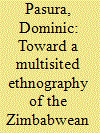

|
|
|
|
|
| Publication |
2011.
|
| Summary/Abstract |
Classical diaspora scholars have constructed diasporic identities in essentialistic and unitary fashion, with phrases like the "Jewish identity," "Palestinian identity," and "Irish identity" denoting migrants as homogeneous ethnic communities. Using the author's multisited ethnographic research among Zimbabweans in Britain, the article explores the diverse ways in which diasporic identities are performed, expressed, and contested in Britain. On the basis of data from a pub, a gochi-gochi (barbecue) and the Zimbabwe Vigil, this article argues that the concept of diaspora, by emphasizing a static and singular conception of group identity, removes the particular ways in which diasporic life is experienced. The ethnographic "sites" were chosen to highlight different geographic settings to show the contrast between multicultural global cities and how different spaces of association attracted distinctive diasporic communities of race, ethnicity, gender, class, and legal status. The article identifies a pattern of diasporic identity development that largely uses the homeland as a frame of reference, and this is contrasted with alternative, hyphenated identities that challenge the fixation of identities to a specific place. It can be suggested that these diasporic identities are bottom-up forms of resistance to the institutionally ascribed refugee identity, perceptions of blocked social mobility, racism, and discrimination in the hostland.
|
|
|
|
|
|
|
|
|
|
|
|
|
|
|
|
|
|
|
|
|